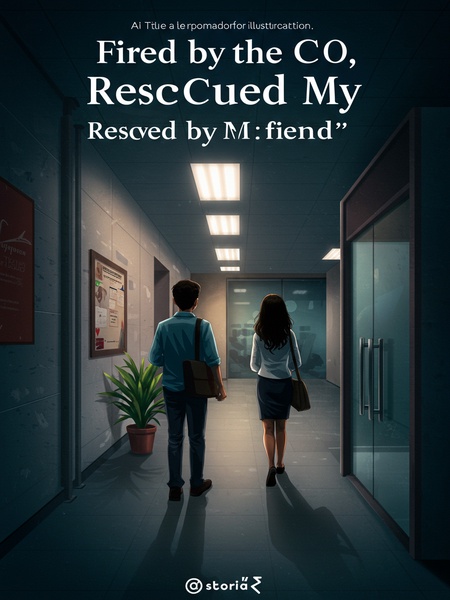Chapter 2: Out in the Cold
We regret to inform you that, due to a company-wide personnel adjustment, your employment will be terminated.
The HR’s email was so cold, it felt like it came from a machine. No ‘thank you’, no ‘we appreciate your service’. Just a plain, heartless sentence. My blood ran cold.
Your access card has been deactivated. Please collect your personal belongings immediately.
Before I could even process it, the security guard—a fellow from my own village, who’d saved me parathas in the canteen—appeared at my cubicle. His eyes were apologetic, but he wouldn’t meet mine. For a beat, there was silence; my hand hovered over my ID, not wanting to let go. The card felt heavy in my palm—weighted with years of effort and sudden humiliation. He gently slid it from my fingers, then tucked it into his pocket. The swipe machine flashed red. It was done.
I stood frozen, the world moving in slow motion.
It was as if someone had poured a bucket of cold water over my head. I stared at the keyboard, mind blank. In our country, losing a job carries a shadow—‘beta, ab ghar kaise chalega?’—echoing from every relative’s WhatsApp forward.
I thought HR had called me for a routine meeting. Layoff never crossed my mind.
I’d even brought my tiffin, looking forward to aloo paratha at lunch. Now, it seemed laughable to worry about food.
Three years ago, the company was a tiny startup with less than twenty people.
Those days—no AC, borrowed whiteboard, and the fresh paint smell—were special. We shared samosas for breakfast, dreams for dinner.
I grabbed the opportunity in virtual interaction tech, building the core project framework single-handedly.
I was the madman in the corner, diagrams scrawled with paan-stained fingers, chasing a vision no one else saw. Friends called me crazy for joining, but what’s life without a little madness?
Night after night, I worked overtime, creating our first product—Raahi, letting people use glasses or car windows to interact virtually with their environment.
My mother would call at 2 a.m., scolding for missed dinners. I’d lie: ‘Bas, thoda aur kaam baaki hai.’ My eyes burned, but the code felt alive under my hands.
No more clunky VR gear—users could finally feel like they were living in a sci-fi movie.
For once, I felt like a Rajkumar Hirani film hero—making technology magical and desi. It wasn’t just work; it was a dream come alive.
The moment Raahi launched, it took the market by storm.
Phones rang nonstop. Newspapers wrote: ‘Desi Innovation: Made in India, For India’. My parents saved every article, pasting them into a scrapbook.
Agents and developers lined up for partnerships.
Every day, someone new brought mithai, hoping for a piece of Raahi. The office smelled like a mithai shop.
Raahi’s ecosystem rose like a skyscraper.
Watching code turn into something that stood tall in the tech skyline—there was pride in every heartbeat.
Our company grew from twenty to five thousand employees.
Suddenly, so many new faces—different languages in the cafeteria, old-timers grumbling about ‘IT waale’ taking all the best seats. The buzz of ambition was everywhere.
Raahi’s development was booming. We rushed updates, haunted tech forums, and I upgraded Raahi’s system to a cutting-edge, highly available architecture.
My phone was always in my hand, even during lunch. I became a regular on Stack Overflow—my username finally getting some respect.
It was tough—very few truly understood the core tech.
Late-night chai breaks with those who ‘got it’—we bonded over bug fixes, eyes red but spirits high. We were the silent backbone, and we knew it.
I poured myself into work, nothing else mattered.
Friends stopped inviting me to weddings, Maa sighed and made dal-chawal every Sunday, hoping I’d show up. I rarely did.
That’s when Amit Singh arrived.
He entered like a Bollywood supporting actor—polished shoes, confident handshake. He ordered cappuccino instead of chai, and the HR ladies giggled when he walked by.
At first, he shadowed me, handling minor tasks. Slick and a master at networking upwards.
He was at every office birthday, made all the right noises in meetings, and always managed to be in the boss’s cabin during promotions.
His social life was golfing with bigwigs and afternoon chai with product managers.
He could sweet-talk anyone—once quoting Kabir Das to HR and Shah Rukh Khan to interns. Always something for everyone.
When it was time for the new Raahi product launch, they asked me to write a script.
Script-writing was never my thing. I preferred code to crowds; public speaking made my palms sweaty.
I found it tedious. Amit volunteered, wrote the script, and hosted the launch.
He wore a suit and tie, shoes shining, delivering a speech with TV-host confidence. The crowd loved it.
He was articulate and enthusiastic, so I focused on tech. After that, every launch was his show.
It suited me. I could hide behind the servers while he took the limelight. That was peace for me.
I just wanted to make Raahi better.
I came in early, stayed late, perfecting the product, not caring for applause. My world was lines of code, debugging, and that small group who cared as much as I did.
He claimed to be Raahi’s chief engineer. Outsiders took it for granted.
At first, it hurt. But after a while, I stopped correcting people. Jo hai, so hai. I knew the truth—and so did the code.
Riding his connections, he climbed to CEO.
He started appearing in business magazines, talking ‘homegrown innovation’. Suddenly, he was the brains behind Raahi. It was almost filmi, the way he rose.
Meanwhile, I finished the Raahi upgrade, and my workload finally eased up a bit.
For the first time in years, I could breathe. I went home early once, and Maa nearly fainted in shock. But peace, I realised, never lasts long in this line of work.
Continue the story in our mobile app.
Seamless progress sync · Free reading · Offline chapters